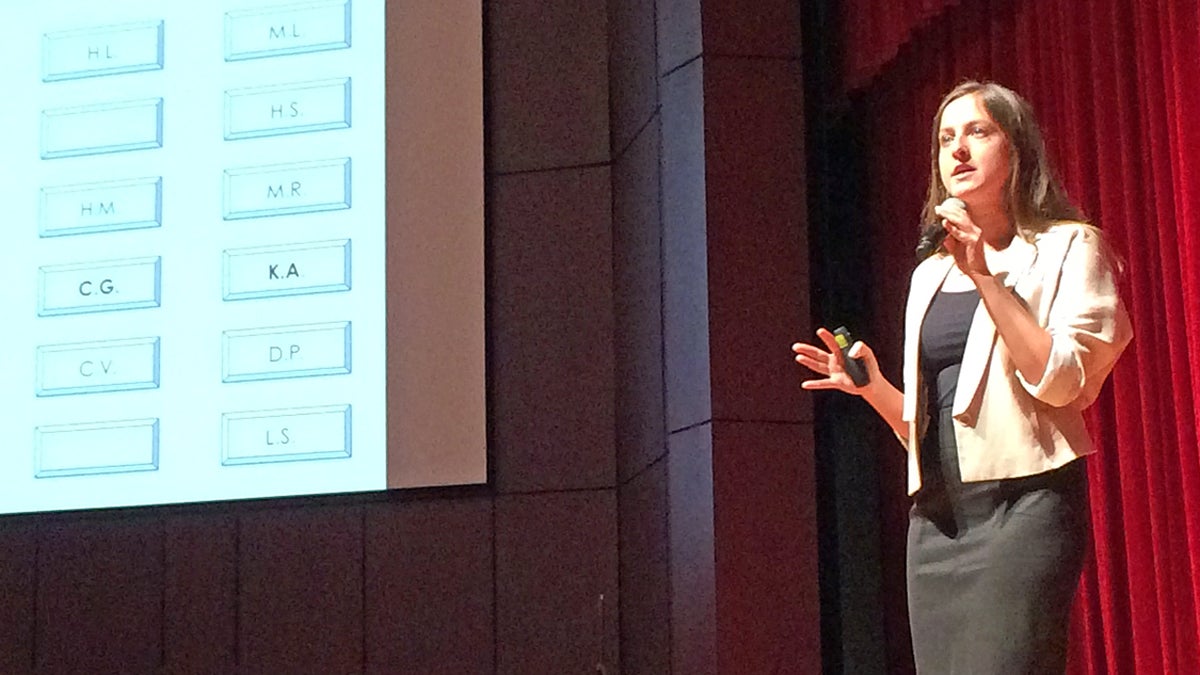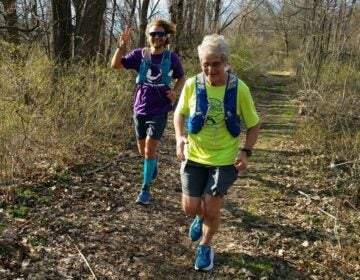Virginia Tech shooting victim speaks at South Jersey school safety conference

Kristina Anderson, a victim of the 2007 Virginia Tech shooting, speaks to the ninth annual School Safety and Security Conference in Sewell, New Jersey. (Joe Hernandez/WHYY)
More than a hundred law enforcement officials, school administrators, and community members turned out for the School Safety and Security Conference in Sewell, New Jersey, Tuesday to discuss a new public health initiative as well as some “best practices” for the upcoming school year.
But what captured the attention of the audience was the keynote speech by Kristina Anderson, who was wounded in the 2007 Virginia Tech shooting that left 33 dead and another 17 injured.
“We can’t change what happened at Virginia Tech, but if we can save one more life, it won’t all have been for naught,” she said in a presentation rife with jokes and suggestions on improving school safety.
Anderson implored the crowd of police and education professionals to prepare for an “active-shooter” situation — and other school crises — before it’s too late.
“A lot of times we hear things like ‘we never thought it could happen here until we heard your presentation or another survivor that has lived through this event,'” she said. “And [telling my story] brings it home. They realize it really could happen in their school, unfortunately, in their city, and that they have to do something about that.”
Speakers addressed a wide range of issues from cybersecurity and school building safety to public health and drug use.
James Corbley, a representative from the New Jersey Department of Education, emphasized the need to conduct school evacuation and lockdown drills at inconvenient times, such as during class changes or inclement weather, in order to plan for unforeseen circumstances.
“How do we have to notify people out on the athletic field? Do we make the announcement in English and Spanish,” he asked the crowd. “You have to think outside of the box.”
Corbley also highlighted the need to ensure the school’s phone system is operating properly, lock all exterior doors, and conduct background check on outside workers.
Earlier in the program, officials with the Gloucester County Prosecutor’s Office discussed details of a new initiative to fight opiate abuse among children and young adults, as addiction rates in the area rise.
One problem for addicts and their families is the availability of adequate resources to explain how addiction works and what strategies could be used to overcome it, said Sarah Kennedy, a recent Williamstown High School graduate whose brother Jake died of a heroin overdose in December.
“If somebody would have sat down and told me what was going on with Jake, and how the drug was affecting him, and they would’ve showed me the different resources I could’ve used to help him or how to support him in the right ways, I feel like he might be here today,” she said. “Or at least things might’ve been different.”
As part of Gloucester County’s opiate abuse prevention effort, officials and community members will hold information assemblies in schools, provide training for teachers and parents, and organize classroom workshops about drug education.
The conference was sponsored by the prosecutor’s offices offices of Gloucester, Salem, Camden, Cumberland, Atlantic, Cape May, and Burlington counties.
WHYY is your source for fact-based, in-depth journalism and information. As a nonprofit organization, we rely on financial support from readers like you. Please give today.




